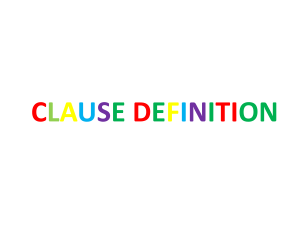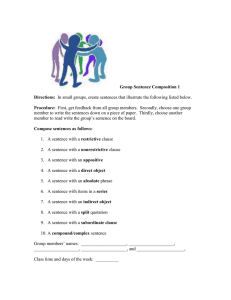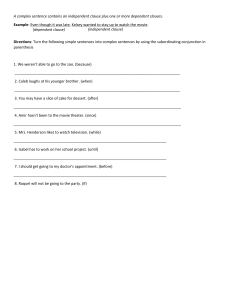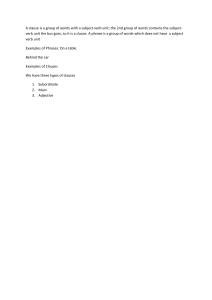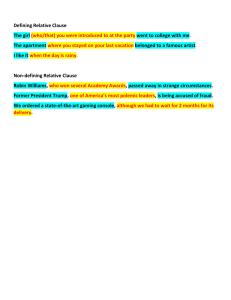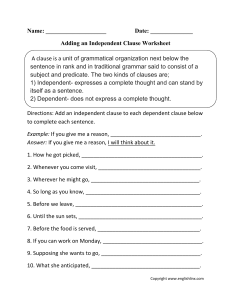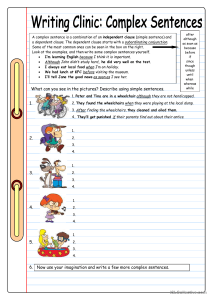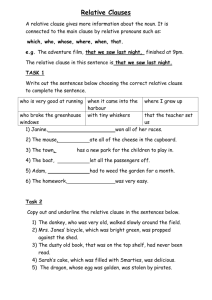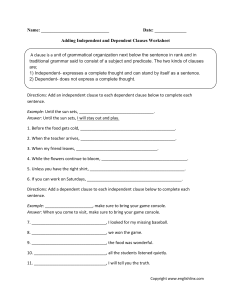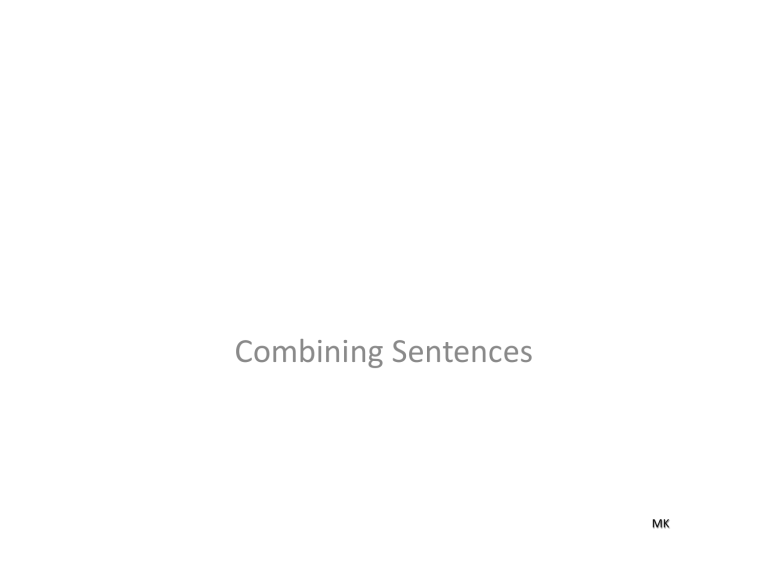
Combining Sentences MK What is a clause? • A clause is group of words that has a subject and a verb. • There are two kinds of clauses.... 1.Independent clause (main clause) • An independent clause is a complete sense by itself. Eg. • She likes dancing. • Students should be hardworking. sentence. It makes 2. Dependent clause (subordinate clause) • A dependent clause is NOT a complete DOES NOT make sense by itself. Eg. • because she is tired • but I was ill • so they were working sentence. It Do these sentences make sense? An independent clause shows a complete thought because it is a complete sentence. On the other hand, a dependent clause is not a complete sentence because it depends on an independent sentence to express a complete thought. Eg. Because I woke up late this morning, I missed the bus. (dependent clause) (independent clause) We can combine/join dependent clauses with independent clauses by using words that show addition, reason, result, contrast and alternative. Reason because/ as/ since Result so Contrast/Opposing idea but Addition and Alternative / Choice or Linker: Reason ● I worked until midnight last night ● very tired today. I’m very tired today because I worked until midnight last night Because I worked until midnight last night , I’m very tired today. !!!Pay attention to the punctuation!!! • I watched TV last night because my favorite program was on. (NO COMMAS) • Because my favorite program was on, watched TV last night. I (put a comma after the reason clause) Linker:Adding Ideas ● she can buy things from cheaper shops…. ● she can find some very good second hand shops for everyday items. She can buy things from cheaper shops , and she can find some very good second hand shops for everyday items. LINKER: CONTRAST. but English is not his native language independent clause ,but he can deliver impressive presentations in English at meetings. dependent clause LINKER: RESULT (We use the linker “so” to express result. The punctuation of “so” is the same as “but.” We use a comma before “so” to connect two independent sentences. ) 1- People don’t want to spend time with her. She is an aggressive person. People don’t want to spend time with her because she is an aggressive person. result reason Because she is an aggressive person, people do not want to spend time with her. She is an agressive person, so people don’t want to spend time with her. reason result 2- It was rainy yesterday. We didn’t go to the concert. We didn’t go to the concert because it was rainy yesterday. reason result Because it was rainy yesterday, we didn’t go to the concert. It was rainy yesterday, so we didn’t go to the concert. reason result I like coffee ___ but I don't like tea. but I can ski. I cannot swim ____ so and because but because I want a new TV _______ the one I have now is broken. because we have nothing We have to go shopping ______ for dinner. but she didn't dance. She went to the disco _____ because I'm studying English ________ I love languages. because He is sad ___________ he saw an accident. or so /and /because /but /or but the English one The history test was difficult ___ was easy. ,so I’m studying this We have a test on Monday ___ weekend. I don’t have to go shopping because ______ the fridge is full. She wants to go to the cinema but ___ I don't like that film. I can't sleep ____ ,so I'm going to drink a glass of hot milk. Read the paragraph about Yoko Ohara, and complete the missing parts using but/or/because/so/and. Use each connector only once. Yoko Ohara is from Japan. She is married, (1) and she has two children. They live in Ohio, USA. Their house is small, (2) but it has a big garden. Her children like playing outside, (3) so they usually play football in the garden in the afternoon. Yoko and her husband speak English well (4) because they go to a language school every day. In the evenings, they watch TV (5) or play Scrabble with their children. Linker: Purpose ● you should cancel your credit cards…. ● stop getting into more debt You should cancel your credit cards in order to /to getting into more debt. In order to /to stop getting into more debt , you should cancel your credit cards stop PURPOSE (positive sentence) to/in order to +V1 (negative sentence) not to/ in order not to + V1 Why is she learning English? Examples: 1. She is learning English because she wants to get better job opportunities. She is learning English to/in order to get better job opportunities. To/In order to get better job opportunities, she is learning English. 2. Learners of English can use a collocations dictionary if they do not want to confuse word partnerships. Learners of English can use a collocations dictionary in order not to/ not to confuse word partnerships. !!!Pay attention to the punctuation!!! • You should stop smoking in order to/to save money. (NO COMMAS) • In order to/to save money, you should stop smoking. (put a comma after the first clause) Linker: Desired Outcome (what the speaker wants to happen) ● you should find a better job…. ● you can earn more money You should find a better job so that more money. you can earn Can you use so that at the beginning of a sentence? NO COMBINING SENTENCES WITH ADVERB CLAUSES OF PURPOSE so that I study very hard dependent clause so that I can be successful. independent clause Examples: • She is learning English so that she gets/can get/will get better job opportunities. • She has been learning English so that she gets/can get/ will get better job opportunities. • She was learning English last year so that she got/could get/would get better job opportunities. COMBINING SENTENCES WITH ADVERB CLAUSES OF PURPOSE so that • Present tense • present perfect • future tense • Past tense can / may/ will + V1 so that could / might / would + V1 Examples: • She is studying very hard this year so that she can pass the exam. • I closed the door so that the noise in the next room wouldn’t bother me. • She went to London so that she could see her friends. TASK 2. Rewrite the sentences with ‘to, in order (not) to and so that’. 1. She went to London. She wanted to learn more about advertising. (in order to) She went to London in order to learn more about advertising. 2. He is working two jobs at once as he wants to buy a bigger house for his family. (to) He is working two jobs at once to buy a bigger house for his family. 3. The company spent a lot of money on advertising because they didn’t want the campaign to fail. (so that) The company spent a lot of money on advertising so that the campaign did not/would not fail. TASK 2. Rewrite the sentences with ‘to, in order (not) to and so that’. 5. She has attended a crash course since she wanted to pick up the basics in English. (in order to) She has attended a crash course in order to pick up the basics in English. 6. The owner of the company organizes tours and family holidays because he wants his employees to get to know each other in an informal setting. (so that) The owner of the company organizes tours and family holidays so that his employees (can/will) get to know each other in an informal setting.
